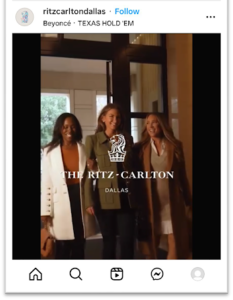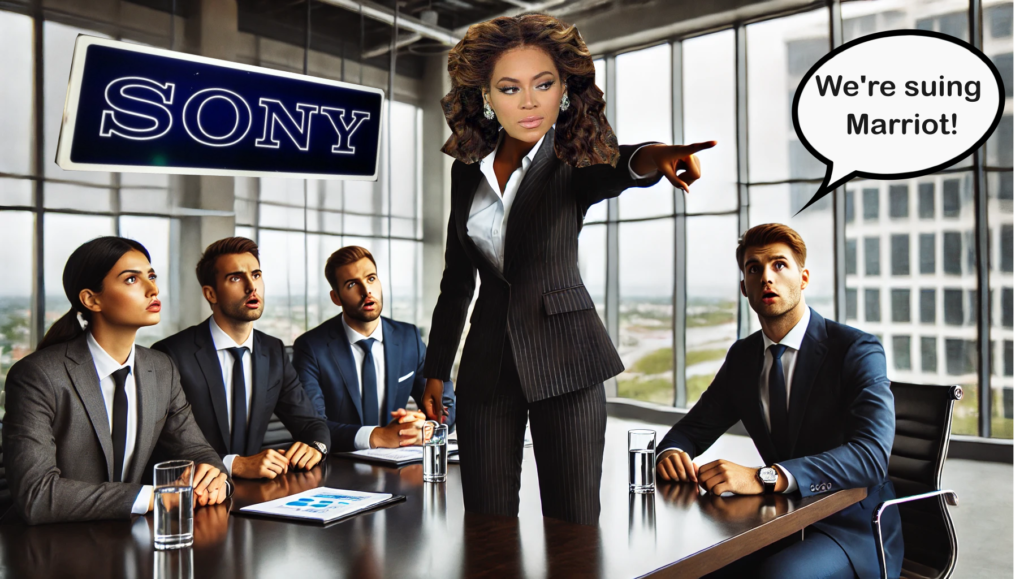On the day of the release of the hit song “Texas Hold ‘Em” by Beyoncé, a Marriott social media employee probably thought it was a brilliant idea to have the song in the background of an Instagram post for the Ritz-Carlton Dallas location. I imagine the thought process went something like “if we use the song to promote a Texas hotel, we’ll definitely see more guests visit us because of the world’s universal love of Queen Bee”. Unfortunately for this employee, this situation may have contributed to Marriott’s broader intellectual property infringements of using Sony’s songs in their social media posts without proper permission. In fact, Sony filed a claim against Marriott last month in Delaware district court (the “Claim”) for this very reason. This blog will examine the Claim, the merits of Sony’s arguments, as well as implications for brands and influencers who may be thinking about using popular songs in their sponsored social media content.
The Claim
Sony filed the Claim against Marriott hotels for using Sony’s music without permission on various Marriott-owned and operated social media pages, as well as on the channels of influencers it hired.1 The Claim further alleges that:
Sony gave Marriott notice of its infringing conduct on multiple occasions between January 2020 – March 2024;2
Even after being put on notice of its infringing conduct, Marriott continued to populate its social media pages with new videos containing unlicensed Sony music;3 and,
Marriott’s infringement was willful because Marriott knew how Sony works with brands when it comes to using their licensed music for commercial purposes (ie, by entering into licensing agreements), and chose not to do so.4
The relief being sought by Sony is:
A declaration that Marriott wilfully infringed Sony’s copyrighted sound recordings in violation of the United States Copyright Act (the “Act”)5;
A permanent injunction requiring Marriott and its affiliates to cease using any of Sony’s rights protected by the Act; and,
Monetary damages, which can be up to the amounts proven by the infringements, or, at Sony’s election, up to $150,000 per infringed work.6
How Sony Owns & Licenses Music
 Sony owns copyrights and/or exclusive rights to many of the most popular songs in the world. Music companies such as Sony often invest in the front end of an artist’s career so an artist can get their careers off the ground. For example, a new artist may not have the money to fund their debut album, so companies like Sony will advance money to the artist to allow the artist to record, market, and obtain the services they need to achieve commercial success (or at least to attempt to achieve commercial success).7 In exchange, copyright law grants the copyright owner (ie, music companies) the exclusive right to, among other things, reproduce and distribute copyright works, publicly perform and transmit those works, and create derivative works of the originals.8 Accordingly, to be able to legally use copyrighted music in promotional or commercial activities without infringing a third party’s intellectual property, the person seeking to use the copyrighted music needs permission from the copyright owner, often in the form of a licensing agreement.9
Sony owns copyrights and/or exclusive rights to many of the most popular songs in the world. Music companies such as Sony often invest in the front end of an artist’s career so an artist can get their careers off the ground. For example, a new artist may not have the money to fund their debut album, so companies like Sony will advance money to the artist to allow the artist to record, market, and obtain the services they need to achieve commercial success (or at least to attempt to achieve commercial success).7 In exchange, copyright law grants the copyright owner (ie, music companies) the exclusive right to, among other things, reproduce and distribute copyright works, publicly perform and transmit those works, and create derivative works of the originals.8 Accordingly, to be able to legally use copyrighted music in promotional or commercial activities without infringing a third party’s intellectual property, the person seeking to use the copyrighted music needs permission from the copyright owner, often in the form of a licensing agreement.9
Implications & Thoughts
The Complaint provides strong evidence against Marriott. Assuming that the allegations are true, Marriott should have known that a licensing agreement was required in order to legally use Sony’s music in their posts, especially since the Claim states that parties had previously entered into such an agreement for a 2019 online advertising campaign.10
One reason for Marriott’s misstep could have been due to the expanded feature on Instagram which allowed users to add popular music to posts, which was rolled out in 2022.11 The feature initially only allowed music to be added to stories and reels when it launched in 2018.12 Nevertheless, Instagram expressly states that access to its licensed music library is subject to its agreements with rights holders which are “intended to enable personal, non-commercial uses of music”,13 while Facebook’s music guidelines state that “use of music for commercial or non-personal purposes….is prohibited unless you have obtained appropriate licenses.”14 TikTok’s Music Terms of Services similarly states that users can only include licensed music recordings from the TikTok library for “personal entertainment and non-commercial purposes”.15
All of this to say, if the Claim gets resolved in Sony’s favour, a precedent could be set for other music publishers to be more vigilant in bringing claims against brands and influencers for using copyrighted music in sponsored content, even if that music is publicly available via a social media platform’s music library.
Another important element of the Claim is the allegations that Marriott is vicariously liable for the activities of its influencers who used Sony music in their sponsored Marriott posts. The fact that infringing conduct is being alleged due to the influencers’ conduct serves as a reminder that a well-structured campaign agreement could help limit the ambiguities and issues that may arise in such a situation. For example, some clauses that brands and agencies would want to think about if they are considering using copyrighted music in social media posts include:
What should the indemnification clause say regarding claims brought against a party as a result of the brand’s instructions (or the influencer’s volition) to include music or third-party intellectual property in the influencer’s posts?
Does the brand have removal rights for any influencer posts that do or may result in intellectual property infringement claims?
How does a party’s actual or alleged illegal misconduct affect the parties’ contractual relationship? Are there termination and/or compensation rights?
If you are a brand, agency, or influencer and need support or are looking to strengthen your licensing agreements or campaign agreements, please don’t hesitate to reach out to GME Law.
1 Sony Music et all v Marriott International, Inc, CV-00598, filed May 17, 2024 (the “Claim”).
2 Ibid at para 10.
3 Ibid at para 13.
4 Ibid at para 258.
5 17 U.S.C. §§ 101-810.
6 Supra Note 1 at para 306.
7 Ibid at para 60.
8 Ibid at para 62.
9 Ibid at para 69.
10 Ibid at para 258.
11 Lauren Forristal, How to Easily Add Music to Instagram Posts, Tech Crunch, January 8, 2024.
12 Introducing Music on Instagram Stories, Instagram, June 28, 2018.
13 Access to the licensed music library on Instagram, Instagram.
14 Music Guidelines, Facebook, March 26, 2024.
15 Music Terms of Service, Tik Tok, August 2023.




